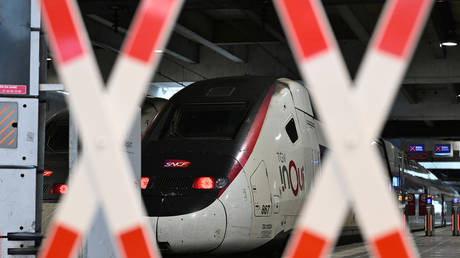Neuralink inserted its implant in its first human patient in January.
Photo illustration by Jonathan Raa/NurPhoto via Getty Images
Neuralink’s brain-chip implant malfunctioned in its first human patient weeks after it was inserted.Wires retracted from the patient’s brain, which impacted its effectiveness, but it was later fixed. Reuters reported the company knew of the risks that wires could retract from the brain years before.
Neuralink was aware of the risks of its brain-chip implant malfunctioning in its first human patient years before it was inserted, Reuters reported.
Noland Arbaugh received the implant in January, but things didn’t go to plan. Weeks after the procedure, some of the device’s wires pulled away from his brain, the company said last week.
A Reuters report, which cites five unnamed sources, said Neuralink knew the wires could retract from its device after it carried out tests on animals. Neuralink decided the device didn’t need to be reconfigured as it believed the risk of the wires retracting was low, the report said.
Elon Musk’s company carried out experiments on animals, including monkeys, before it got approval last May from the US Food and Drug Administration to conduct human trials. It’s starting by testing the implant, called “The Link,” on people with paralysis to enable them to control devices using their thoughts.
The Link has more than 1,000 electrodes and at least 64 wires or “threads,” each thinner than a strand of human hair, some of which pulled out of position.
That caused the impact to be less effective, which resulted in a weaker control of Arbaugh’s ability to move a cursor around a computer screen, Neuralink said last week.
The neurotech firm even considered removing the implant from Arbaugh altogether, The Wall Street Journal reported, but Neuralink later made adjustments that improved its functionality, the blog said.
Arbaugh was paralyzed below the shoulders after a diving accident in 2016, and since receiving the implant he’s been able to control his laptop while lying in bed, browse the web, and play computer games.
In the blog post last week, he said, “[The Link] has helped me reconnect with the world, my friends, and my family. It’s given me the ability to do things on my own again without needing my family at all hours of the day and night.”
The company also plans to implant 10 of its devices in other human patients by the end of this year, the Journal reported.
Neuralink didn’t immediately respond to Business Insider’s request for comment, made outside typical working hours.
Do you work at Neuralink? Got a tip? Contact the reporter at jmann@businessinsider.com or reach out on Signal @jyotimann.11





+ There are no comments
Add yours